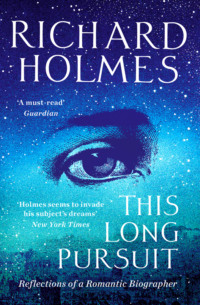
This Long Pursuit: Reflections of a Romantic Biographer
‘I lost all connections with external things,’ recorded Davy, ‘trains of vivid visible Images rapidly passed through my mind … With the most intense belief and prophetic manner, I exclaimed … “Nothing exists, but Thoughts! – the Universe is composed of impressions, ideas, pleasures and pains!” … I was now almost completely intoxicated … I seemed to be a sublime being, newly created and superior to other mortals …’
Davy and Coleridge also corresponded about the nature of pain, and the possibilities of gas-based anaesthetics for use in surgical operations. Coleridge later went to his friend’s chemistry lectures, and enthused: ‘I attended Davy’s lectures to enlarge my stock of metaphors … Every subject in Davy’s mind has the principle of Vitality. Living thoughts spring up like Turf under his feet …’ To Davy himself he made a crucial connection: ‘Science being necessarily performed with the passion of Hope, it was Poetical.’
This led me to look at Davy’s biography, and more generally at the relations between science and literature. For the first time I began to consider how a scientific biography might differ from a literary one. In particular, in my own field of Romantic literature, the connection between Coleridge and Davy made me wonder why the poets and writers of the Romantic period were always presented as hostile to science. Had we unknowingly imported twentieth-century ideas about the notorious split between the ‘Two Cultures’ into Romantic biography? Was there in fact such a thing as Romantic science, and a vital new form of biography to go with it? This is what I began to explore in my next book, The Age of Wonder.
The left-hand side of my notebook became crowded with questions and speculations, many naïve. Did the Romantic men of science (‘men in white coats’) have inner emotional lives comparable in intensity to those of the poets; and if so, what kind of writings would bear witness to this? It seemed possible that scientific biography should be less about individual ‘genius’, and more about teamwork and the social impact of discovery. This might demand something closer to group biography, and a sense of the extended ‘ripple effect’ of science throughout a community. It also raised the pressing question – in the figures of the astronomer Caroline Herschel, the novelist Mary Shelley and the mathematician Mary Somerville – of why women had been excluded from science, in contrast to the way they were establishing themselves in literature.
So from a narrow initial study of Coleridge and Davy, The Age of Wonder (2009) expanded to become the biography of a whole generation, including over sixty writers and scientists, and the very moment when the word and concept of ‘scientist’ itself actually emerged in 1833.
I have subsequently come to feel that the meeting of the two great modes of human discovery – imaginative literature and science – has become one of the most urgent subjects for modern biography to study and understand. I believe this is particularly so in both Britain and America. You could say that if our world is to be saved, we must understand it both scientifically and imaginatively.
I often think of something Sylvia Plath once said: ‘If a poem is concentrated, a closed fist, then a novel is relaxed and expansive, an open hand.’ This leads me to suppose that biography is something else again: ‘a handshake’. A handshake across time, but also across cultures, across beliefs, across disciplines, across genders, and across ways of life. It is a simple act of complex friendship.
It is also a way of keeping the biographer’s notebook open on both sides of that endless mysterious question: What was this human life really like, and what does it mean to us now? In this sense, biography is not merely a mode of historical enquiry. It is an act of imaginative faith. That is what I believe. Putting my hand on my Black n’ Red notebook, that is what I swear to.
Конец ознакомительного фрагмента.
Текст предоставлен ООО «ЛитРес».
Прочитайте эту книгу целиком, купив полную легальную версию на ЛитРес.
Безопасно оплатить книгу можно банковской картой Visa, MasterCard, Maestro, со счета мобильного телефона, с платежного терминала, в салоне МТС или Связной, через PayPal, WebMoney, Яндекс.Деньги, QIWI Кошелек, бонусными картами или другим удобным Вам способом.
Вы ознакомились с фрагментом книги.
Для бесплатного чтения открыта только часть текста.
Приобретайте полный текст книги у нашего партнера:
Всего 10 форматов